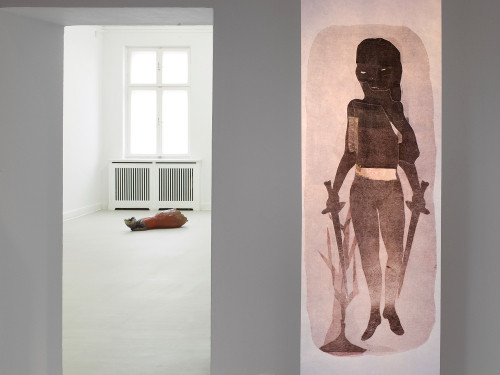Leiko Ikemura
19 Feb - 17 Apr 2016

Installation view "Leiko Ikemura - ... and suddenly the wind turns", Haus am Waldsee, 2016, photo by Roman Maerz
LEIKO IKEMURA
... And Suddenly The Wind Turns
19 February – 17 April 2016
The exhibition "...and suddenly the wind turns" visualises the political-philosophical discourse of the Japanese artist Leiko Ikemura beginning in 2006. On display are landscapes, faces, figures and plants that were created in diverse media in the aftermath of her mother’s death and the catastrophe that was Fukushima. According to the artist, humanity today has reached a point of inflection. A latent sense of threat is prevailing. For Ikemura this raises the question: how can an artist assert herself in these times of globalisation, wars and mass migration?
After a degree course in Spanish literature and art in Granada and Seville followed by a number of years spent in Switzerland the artist moved to Germany in the mid-1980s, taking up residence first in Cologne and later in Berlin. Here Ikemura has not only taught painting at the Universität der Künste for more than twenty years, the city has also become the launch pad for her international career, which subtly manages to mirror Far Eastern and Western approaches to art in one another. Major solo and group exhibitions featuring her work took place in museums all over the German-speaking countries as well as in Japan and Australia. Following on from her two-week cameo appearance entitled Prelude in August 2015, which displayed two of her series of drawings alongside 19th century originals by Utagawa Hiroshige at Haus am Waldsee, the house is now pleased to mount Leiko Ikemura’s first institutional solo show in Berlin.
For more than three decades now the artist has reflected on alienness and fragmentation in her work. However, her melancholy paintings and sculptures yield hardly any straight answers. Today, after a long period in which the artist addressed European art history with great intensity, her more recent works instead seem to provide metaphors for timeless values that reach back to ancient times in both European and Asian intellectual history. Thus Ikemura always elevates her motifs to a level on which the world is conceived of as an open place for inner transformation. In doing so she takes up Japanese spiritual traditions, more so than in earlier stages of her work, which she now melds with Western art practices with great aplomb.
A catalogue in English and German has been published. Go to the shop
Supported by The Berlin borough of Steglitz-Zehlendorf – office for further education and culture; the Mayor of Berlin, Senate chancellery - cultural affairs; the association of friends and supporters of Haus am Waldsee
... And Suddenly The Wind Turns
19 February – 17 April 2016
The exhibition "...and suddenly the wind turns" visualises the political-philosophical discourse of the Japanese artist Leiko Ikemura beginning in 2006. On display are landscapes, faces, figures and plants that were created in diverse media in the aftermath of her mother’s death and the catastrophe that was Fukushima. According to the artist, humanity today has reached a point of inflection. A latent sense of threat is prevailing. For Ikemura this raises the question: how can an artist assert herself in these times of globalisation, wars and mass migration?
After a degree course in Spanish literature and art in Granada and Seville followed by a number of years spent in Switzerland the artist moved to Germany in the mid-1980s, taking up residence first in Cologne and later in Berlin. Here Ikemura has not only taught painting at the Universität der Künste for more than twenty years, the city has also become the launch pad for her international career, which subtly manages to mirror Far Eastern and Western approaches to art in one another. Major solo and group exhibitions featuring her work took place in museums all over the German-speaking countries as well as in Japan and Australia. Following on from her two-week cameo appearance entitled Prelude in August 2015, which displayed two of her series of drawings alongside 19th century originals by Utagawa Hiroshige at Haus am Waldsee, the house is now pleased to mount Leiko Ikemura’s first institutional solo show in Berlin.
For more than three decades now the artist has reflected on alienness and fragmentation in her work. However, her melancholy paintings and sculptures yield hardly any straight answers. Today, after a long period in which the artist addressed European art history with great intensity, her more recent works instead seem to provide metaphors for timeless values that reach back to ancient times in both European and Asian intellectual history. Thus Ikemura always elevates her motifs to a level on which the world is conceived of as an open place for inner transformation. In doing so she takes up Japanese spiritual traditions, more so than in earlier stages of her work, which she now melds with Western art practices with great aplomb.
A catalogue in English and German has been published. Go to the shop
Supported by The Berlin borough of Steglitz-Zehlendorf – office for further education and culture; the Mayor of Berlin, Senate chancellery - cultural affairs; the association of friends and supporters of Haus am Waldsee
